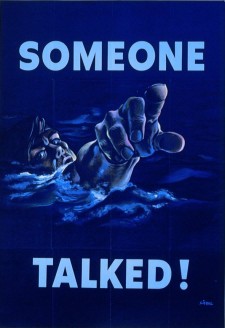The History and Use of "Spoiler Alert"
by Nate Freeman

In her July 14, 2010 article about the premiere of the fourth season of “Mad Men,” Alessandra Stanley neglected to include a phrase that precedes potentially revealing facts in film and TV reviews: “spoiler alert.” Fans read ahead and the damage was done. A certain string of words made moot a device key to the operation of the “Mad Men” universe-the ignorance on the part of the audience of how much time has lapsed between the previous season and the current one-and she did not give readers the choice of whether or not they wanted to know before the episode aired. The information was placed casually in the middle of a sentence-and so, for some, the fun of the anticipation had been ruined, and something would be taken away from the original viewing experience. Betrayal! Stanley had broken the unspoken agreement.
The outrage was widespread. Matthew Weiner, the show’s creator, told the Hollywood Reporter that he was “shocked” and that “A lot of people told me they were blindsided by [the Stanley article].” Writing for Variety, Brian Lowry called out Stanley for “ignoring their plea to avoid spoilers-without so much as a word of warning.” New York magazine placed “Alessandra Stanley spoils pretty much everything in the ‘Mad Men’ season premiere” far on the “despicable” side of its Approval Matrix.
These past two weeks have seen the “spoiler alert” construction hit zeitgeist heights, thanks to the reaction pieces about “Mad Men” and Inception, two projects defined by a massive effort to keep their plots a secret. Both hedged their bets on the fact that people would be more interested the less they knew, pushing writers toward frequent use of the “spoiler alert” tag if they had been privy to these works before — and even some time after — their public release. In his Times article about the reaction to Inception, A.O. Scott said, “The discourse is marked by the ritualistic incantation of two words that may at this point be redundant: spoiler alert.”
In a Washington Post article from Dec. 6, 1994 about “the branching fibers of the Internet,” Amy E. Schwartz claims that, despite “the Net’s still-sparse cultural possibilities” a new language was being born on the few threads that then existed. “On movie buffs’ discussion lists, for instance, there is wide use of the term ‘spoiler alert,’ which is a warning inserted before any comment that would give away a film’s ending.” The Usenet archives compiled on the Google Groups page reveals that nerds were bandying about the phrase as early as June 8 1982, when a commenter placed “[SPOILER ALERT]” before mentioning a detail about Star Trek II: The Wrath of Khan. The movie had been released just four days earlier, so he assumed many had not yet seen it.
By the time the Internet began writing at length about “Survivor” in 2000, it was commonplace to warn readers of the spoilers that gave away information about who was going to get kicked off the island. Roger Ebert issued something of a referendum on the practice of “spoiling” movies for viewers in a 2005 article, detailing his anger with critics who give too much away and explaining his decision to issue “spoiler warnings” in his reviews after seeing them used online.
Now, with every blog writing a weekly recap of every show-shows that are more often than not TiVO’d or DVR’d and watched the next day-the phrase “spoiler alert” is inescapable. It’s even approaching redundancy, as Scott suggested-yes, we know that your “True Blood” post will give away all those incredibly important plot points essential to your enjoyment of that masterwork of television. You don’t have to tell us anymore.
Except… for when you do. We absorb an immense amount of information each day, and there’s no way to clear out an entire bundle of RSS feeds without coming across something-an article, or a tweet, an email, anything-that gives away a key element of a TV show or movie you’ve been planning to see. We’re not going to watch every show when it airs, so when we come across the recaps in a dozen blogs, we need some heads up if something’s going to be spilled. So put in those two words, even if they seem redundant. Because if you do-spoiler alert!-it might save someone’s Sunday night.
